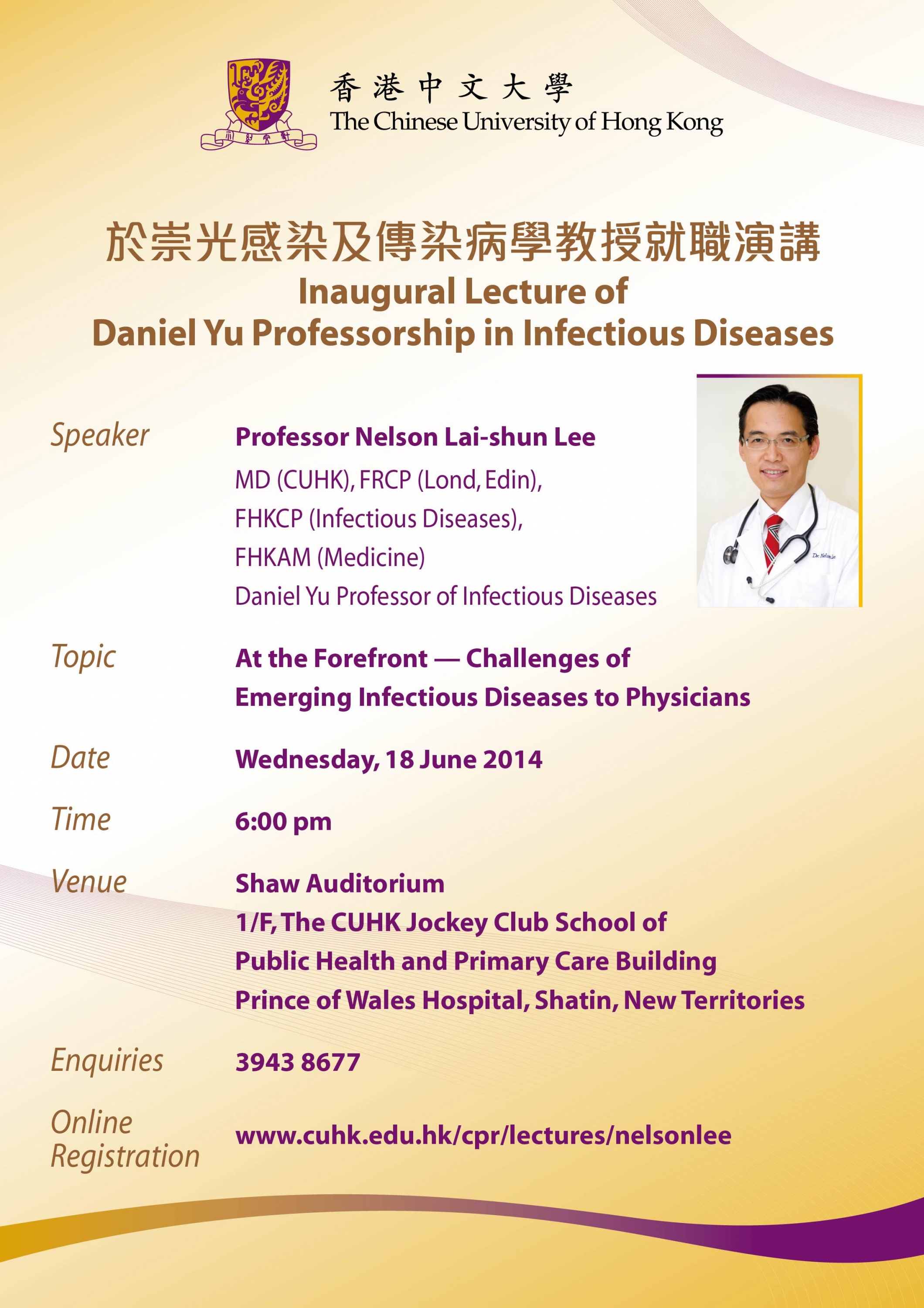活动
于崇光感染及传染病学教授就职演讲–李礼舜教授主讲 「走在最前线 — 新发传染病的挑战」
2014年6月18日
下午六时正
新界沙田威尔斯亲王医院香港中文大学赛马会公共卫生及基层医疗学院大楼一楼逸夫讲学堂
(English only)
Professor Nelson Lai-shun Lee is Professor and Head of the
Division of Infectious Diseases in the Department of Medicine and
Therapeutics at The Chinese University of Hong Kong (CUHK),
and an honorary consultant physician to the Prince of Wales
Hospital. Since graduating from The University of Hong Kong in
1995, he has pursued a career in clinical infectious diseases, and
received his specialist training in Hong Kong and at the University
of British Columbia, Canada. He joined the Department in 2002, and
was appointed as Associate Professor in CUHK in 2005, and Professor in 2011.
Professor Lee’s main research interest is on emerging
infectious diseases with major public health significance. These
include influenza (seasonal, pandemic, avian), Severe Acute
Respiratory Syndrome (SARS) and novel coronaviruses, viral
pneumonia, norovirus infection, antimicrobial resistance,
tuberculosis, and HIV/AIDS. A wide range of clinical, translational
and cross-disciplinary research has been conducted, contributing to
the understanding of the clinical manifestations, diagnosis,
treatment, human transmission, infection control, and
immunopathogenesis of these emerging diseases.
Professor Lee’s research unit is well-known, and actively
participates in international, multicenter clinical trials on
anti-infectives. He has published over 230 research articles, book
chapters and conference papers, including publications in The New
England Journal of Medicine, The Lancet, The Journal of the
American Medical Association, Annals of Internal Medicine, British
Medical Journal, Clinical Infectious Diseases, Emerging Infectious
Diseases, Journal of Infectious Diseases, and Thorax. His research
findings are cited in international health authority clinical guidelines
including those from the World Health Organization, Centers for
Disease Control and Prevention in the United States, and the
infectious diseases societies of America and Australia. He is a
frequently invited speaker in regional and international conferences,
particularly pertaining to the management of severe, complicated
influenza.
Professor Lee is also the Chairman of the Infectious Diseases
Specialty Board of the Hong Kong College of Physicians,
responsible for specialist training and development in Hong Kong.
In addition, he is serving as an academic expert in various health
authority advisory boards, such as the Hospital Authority and the
Center for Health Protection, to advise on public health policy and
research. He has received the Distinguished Research Paper Award
for Young Investigators from the Hong Kong College of Physicians
in 2003 and 2008, International Young Investigator Award from the
Infectious Diseases Society of America, and The Most Promising
Young Investigator Award from the Food and Health Bureau,
HKSAR, both in 2010.
Professor Lee is married to Dr. Anita Ng and has 2 sons.
3943-8677
(English only)
In the past decade, the world has experienced continuous threats
from various emerging infectious diseases caused by novel pathogens.
Avian influenza H5N1, first emerged in 1997 in Hong Kong then
re-remerged in 2003, has become widespread and endemic in Asia.
Severe Acute Respiratory Syndrome (SARS) – associated coronavirus
emerged in 2003 in Guangdong, China had spread via air travel, and
caused a global epidemic in weeks. Worldwide, there were over 8000
infections and 774 deaths. In Hong Kong alone, it caused over 1700
infections and nearly 300 deaths. About one-fifth of SARS victims were
frontline healthcare workers who acquired the infection in the hospitals.
In 2009, a swine-origin H1N1 influenza virus resulted in a pandemic.
Asian cities, including Hong Kong were hit hard, resulting in excessive
hospitalizations and deaths. The H1N1 virus has continued to circulate
in the community since.
In late 2012, another coronavirus, Middle-East-Respiratory
Syndrome (MERS) – coronavirus, emerged, which causes lethal
pneumonia similar to SARS. A more widespread transmission appears
imminent. At the moment, there is an on-going epidemic caused by a
novel avian influenza H7N9 virus along the east coast of China. So far
over 400 cases have been reported, with a cumulative death toll over
130. These emerging virus infections are all zoonotic in origin, and have
acquired the ability to infect humans, escaping the innate host-defense.
They mimic other causes of community-acquired pneumonia seen by
physicians in their daily practice, but typically run a rapidly
deteriorating course. Standing at the forefront, we managed the patients
and researched on the diagnosis, treatment, pathogenesis, nosocomial
transmission, and means of protection for our healthcare workers. Our
findings have equipped physicians in Hong Kong and elsewhere to meet
the challenges posed by these emerging infectious diseases.


